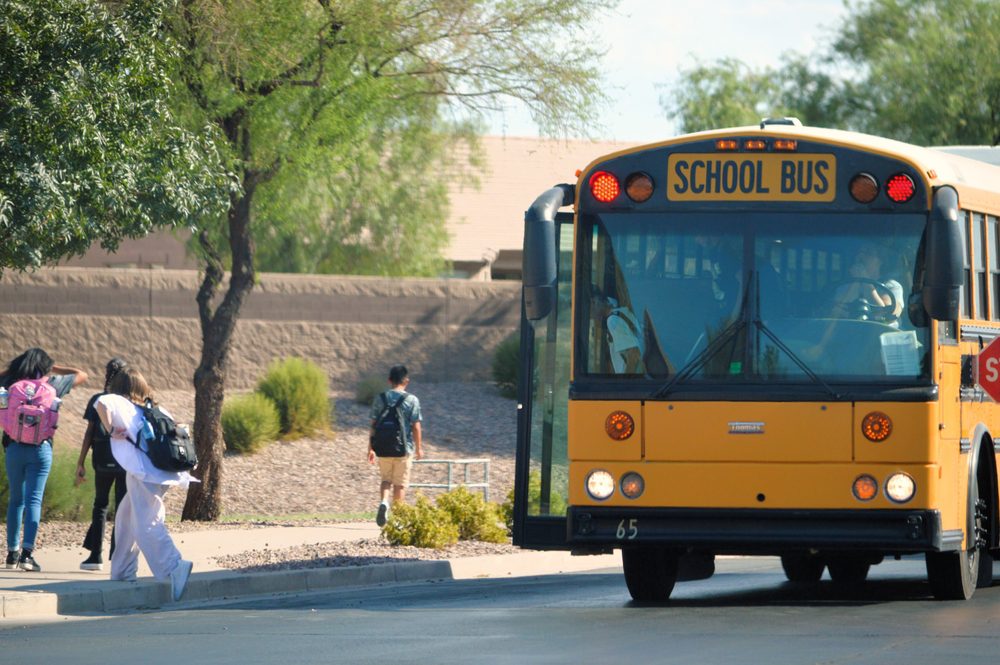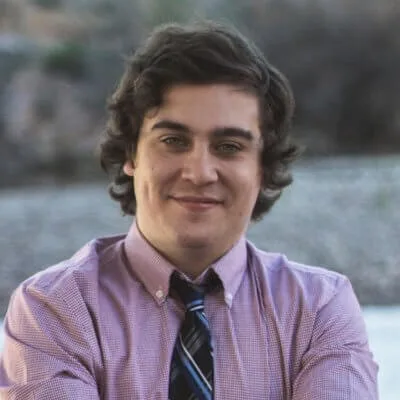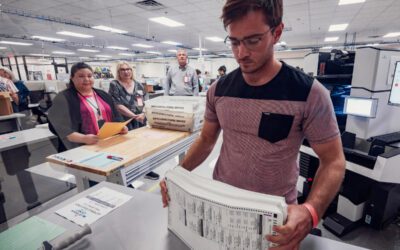
Elementary school kids in 2023 getting off a Maricopa Unified School District bus in their neighborhood. (Shutterstock Photo)
“We believe that we are in a district where the majority of citizens and families want good discourse in problem solving and not mud-slinging and name-calling.”
There’s an interesting story developing in Scottsdale, where three open seats on the public school board have set up a premise you might expect in a play or a movie.
Six people, all vying for those seats, have combined into two factions—each running on a “joint ticket.”
On one side, the joint ticket includes three parents—a university technology and data director, the Harvard-educated founder of Blackboard, and Arizona’s 2021 National Superintendent of the Year.
On the other side, three more parents—a paralegal, a lobbyist, and a former minor league baseball player.
School board races in Arizona are supposed to be nonpartisan, and the election for Scottsdale Unified School District’s governing board is no different. But those “joint tickets”—which mean little to voters, who are free to elect any of the candidates individually—are perhaps serving a partisan function. In other words, while neither trio is advertising which political party they support, the joint tickets are helping them send a clear message to voters that three candidates share one set of priorities, and three share quite another.
Before jumping into each ticket, keep in mind that being a school board member is being a volunteer—not one of the candidates below will get paid if they win their election.
“Protect SUSD: Building a Stronger Community Together”

Mike Sharkey, Donna Lewis, and Matt Pittinsky are running for the Scottsdale Unified School District governing board. (Photo courtesy of Mike Sharkey)
There’s nothing new about a joint ticket—Americans vote for one every four years in presidential elections, when they choose a president and vice president.
There’s a second kind of joint ticket, too—a more unofficial version, which won’t be obvious on any ballot. The candidates themselves decide to campaign together, making it “joint” in marketing only. Voters still choose candidates individually—they’re not grouped on Election Day.
It’s particularly useful in “nonpartisan” races. That’s because on the nonpartisan section of the ballot, candidates are listed without their political affiliations. Grouping two or more candidates together in campaign marketing helps voters remember them better, lowering the odds that folks will shrug and fill in a bubble for a name they’ve seen on yard signs, for example.
Dr. Donna Lewis, Dr. Matt Pittinsky, and Mike Sharkey are campaigning together under a “Protect SUSD” banner, with a focus of “building a stronger community together.”
“We’re professionals who live in the community, care about the schools, and maybe it’s a nostalgic way of looking at it, but view running for school board like being involved in the Chamber of Commerce or any number of other nonpartisan pieces of our community,” Pittinsky said.
Pittinsky is an educator-turned-entrepreneur who earned a master’s degree in education from Harvard and a PhD in the sociology of education from Columbia University. He then went on to cofound two education tech companies—Blackboard and Parchment. His kids all went to SUSD schools, with two still in them. He’s also an Eagle Scout.
RELATED: This new AZ grad is running for school board against far-right extremists in Peoria
“We’re not running to be the people that bypass policy and try to choose what’s taught in a classroom, what books are in the library, what teachers are allowed to say or not allowed to say,” he said.
Pittinsky’s primary goal is to get more students and families to choose Scottsdale public schools. He also wants to understand why many choose charter or private schools.
“How can we as a board, representing the community, work with the district to identify those factors and address them?” Pittinsky said. “And one of them is misinformation about the schools we have. [They’re] amazing schools and our kids go to the top colleges, and that’s where Mike is talking about storytelling with data.”
Mike Sharkey does that for a living. As executive director of data and analytics at Arizona State University, he uses data to get a more objective picture of what’s happening in groups and communities, to make predictions, and to help teams make strong decisions based on facts.
“We believe that we are in a district where the majority of citizens and families want good discourse in problem solving and not mud-slinging and name-calling,” Sharkey said.
His kids spent their full K-12 education going to SUSD schools, and now that they’re grown, Sharkey still mentors students on the Chaparral High School robotics team.
Sharkey said his background in data analysis would be invaluable to the board, and he’d love to use that analysis to help administrators and schools make smart, fact-based decisions.
“[Most families] don’t want their children’s curriculum being determined by a small number of loud people,” he said.
The third member of their trio, Donna Lewis, has a PhD in educational leadership from George Washington University. In 2021, she was named Arizona’s National Superintendent of the Year.
The Lewis, Sharkey, and Pittinsky ticket has been endorsed by former Scottsdale school board member Denny Brown and former school board candidate Mary Gaudio. They were also endorsed by Paradise Valley Mayor Jerry Bien-Willner and former Scottsdale Mayor Sam Campana, a Republican.
“Just Be Honest”
Gretchen Jacobs, Jeanne Beasley, and Drew Hassler are running on an opposing joint ticket for the three open SUSD governing district seats, under the campaign name “Just Be Honest”—with the slogan’s J, B, and H representing each of their last names.
All three candidates have or have had children in the SUSD.
Beasley is a paralegal whose priorities include approving “appropriate” curriculum, removing “unnecessary resources and programs that do not focus on core education,” and investing in “training for teachers and staff to protect our students, themselves, and their classrooms,” according to her campaign website.
Hassler is a local bartender and former minor league baseball player whose campaign website says he wants to “protect our children,” “support our hard-working teachers,” and “invest in quality education.”
Jacobs is an attorney and the CEO of Arizona Governmental Affairs—a lobbying company named one of the best and “hardest” by the Arizona Capitol Times.
Jacobs was allegedly briefly and tangentially part of Arizona’s fake electors scheme in 2020, according to reporting from Politico.
Politico reported that Jacobs asked former Trump White House Press Secretary Stephanie Grisham if she could find $104,000 to hire a political consultant to find evidence of fraud in the election.
“I can’t bear that we would lose this over not having $100k to prove what we know is fraud,” Jacobs allegedly texted to Grisham. Politico reported that Grisham then forwarded the text to a Trump campaign aide, asking, “Any ideas?”
Jacobs later told the Arizona Mirror that Grisham ultimately told her to drop it and not to waste anyone’s time or money on pursuing claims that the 2020 election was fraudulent.
A group called Scottsdale Unites for Educational Integrity—which has a section on its website dedicated to “culture war” topics like “books to be aware of,” “clubs to be aware of,” and “immunizations–know your rights”—has repeatedly advocated for Scottsdale residents to vote for Beasley, Hassler, and Jacobs.
The Scottsdale Unified School District educates about 22,000 students from Phoenix, Paradise Valley, Fountain Hills, Tempe, and Scottsdale. About 3,000 people are employed by the district, across 29 school campuses and one online school.
Members of the governing board are tasked with hiring and firing superintendents, determining if bond and override elections reach local ballots, and deciding on supplemental curriculum, among other duties.
“This is a really important election,” said Pittinsky. “The majority direction of the Scottsdale school board will be set for the next four years, and I think every family and every homeowner who sees how central our schools are to our community needs to pay attention and really look at the candidates running, and ask whether these are candidates that have the professional background and are motivated by the right things to be on the board, and are going to reflect their values.”
The election will be held during the Nov. 5 general election. Find a copy of your ballot and check your voter registration here. To vote early or by mail, learn more here.
Support Our Cause
Thank you for taking the time to read our work. Before you go, we hope you'll consider supporting our values-driven journalism, which has always strived to make clear what's really at stake for Arizonans and our future.
Since day one, our goal here at The Copper Courier has always been to empower people across the state with fact-based news and information. We believe that when people are armed with knowledge about what's happening in their local, state, and federal governments—including who is working on their behalf and who is actively trying to block efforts aimed at improving the daily lives of Arizona families—they will be inspired to become civically engaged.


Republican Rep. Juan Ciscomani wins reelection to Arizona US House seat
Juan Ciscomani won his first term in 2022 when he beat Kirsten Engel by over 5,200 votes. PHOENIX (AP) — Republican Rep. Juan Ciscomani won...

No, Elon Musk did not hack Arizona’s election results with Starlink
Only three Arizona counties use Musk's Starlink, and two of them voted for Kamala Harris. As President-elect Donald Trump begins filling key posts...

Why AP called the US Senate race in Arizona for Ruben Gallego
The AP only declares a winner—in this case, Ruben Gallego—once it can determine that a trailing candidate can’t close the gap and overtake the vote...

Women have led other democracies, but US voters rejected the 2 who tried—what will it take to elect a female president?
In the United States, 45 men have served as president, starting with George Washington in 1789. Donald Trump’s reelection extends that streak....





